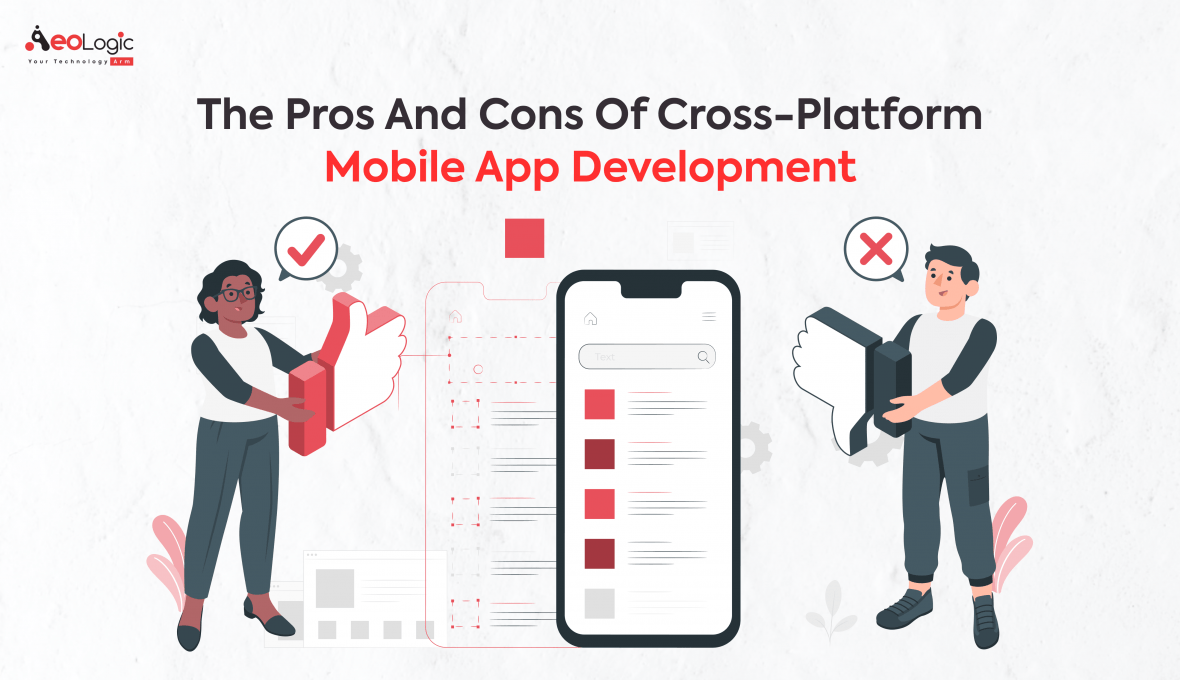When it comes to mobile app development, choosing the right approach can make a significant difference. This choice can affect the app’s performance, user experience, development time, and cost. In today’s highly competitive digital market, It has been a popular choice for many developers. Yet, like every other thing, it also has its pros and cons. In this article, we’ll delve deeper into the “pros and cons of Cross-Platform Mobile App Development.
The Rise of Cross-Platform Mobile App Development
The global mobile application market size was valued at $154.05 billion in 2020, and it’s expected to reach $407.31 billion by 2026, growing at a CAGR of 18.4% from 2021 to 2026 (Statista, 2022). In this expanding market, businesses have two primary routes to choose from – native app development or cross-platform app development.
According to the 2023 Developer Nation Survey by SlashData, nearly 42% of software developers are using cross-platform frameworks. This trend testifies to the popularity of cross-platform app development. But before we dive deeper into the pros and cons, let’s first understand what it is.
Checkout our trending blog: Enterprise App Development Vs Standard App Development
What Is Cross-Platform Mobile App Development?
It involves creating mobile applications that can run on multiple operating systems (like Android and iOS) with a single codebase. It stands in contrast to native app development, which requires different codebases for different operating systems. Now, let’s dive into the Pros and Cons of Cross-Platform Mobile App Development.
5 Pros of Cross-Platform Mobile App Development
1. Cost-Effective
One of the most compelling advantages of it is cost-effectiveness. In contrast to native app development, where separate codebases are required for different platforms, cross-platform development uses a single codebase. This not only reduces the required man-hours but also limits the resources needed for the project.
According to Xamarin, a popular cross-platform development tool, businesses can save up to 50-80% of development costs by opting for cross-platform development. These savings can be then invested in marketing the app or enhancing its features, thereby providing a competitive edge.
Also Read: The Importance of Mobile App Testing and Quality Assurance
2. Quick to Market
In today’s fast-paced digital world, being first to market can provide a significant competitive advantage. With cross-platform development, you develop one application that can be deployed across multiple platforms simultaneously. This significantly reduces the time-to-market compared to developing separate native applications for each platform.
Time efficiency is not just about coding. It extends to testing and maintenance as well. Since there’s only one codebase to test and maintain, these processes become considerably quicker and more efficient.
Also Read: The Importance of Mobile App Testing and Quality Assurance
3. Easier Maintenance
Another benefit of using a single codebase is that it simplifies app updates and maintenance. With native app development, changes or updates need to be implemented separately for each platform. However, with cross-platform development, modifications made to the source code are reflected across all platforms.
This not only makes the process faster but also ensures consistency in the user experience across different devices and platforms. Moreover, developers can quickly fix bugs or vulnerabilities across all platforms, enhancing the overall security of the app.
4. Broader Reach
A mobile app’s success is often measured by its user base, and that’s where cross-platform development shines. By creating an app that can run on any platform, you significantly widen your reach.
As per a report by StatCounter GlobalStats, as of July 2023, Android holds a 71.93% share in the mobile OS market, while iOS holds a 27.47% share. By developing a cross-platform app, you can cater to both these user bases, thus maximizing your potential audience.
This wider audience reach can lead to increased user engagement, better brand recognition, and ultimately, higher profits. Plus, with a single marketing strategy, you can reach users across all platforms, further saving time and resources.
5. Simplified Code Management
An additional pro of cross-platform mobile app development is simplified code management. This development strategy allows developers to reuse a significant portion of the code across different platforms, eliminating the need to write distinct code for each platform.
As a result, developers can manage and troubleshoot code more efficiently. When a bug is detected, they can fix it in one place, and the solution gets propagated across all platforms. This uniformity streamlines code management, making it less complex and time-consuming.
Moreover, simplified code management also allows for easier implementation of new features and updates. Any additions or modifications are reflected across all platforms simultaneously, ensuring that all users, regardless of their device, have access to the latest features and the most up-to-date version of the app.
Hence, simplified code management not only eases the workload for developers but also ensures a consistent and feature-rich user experience across all platforms. But it’s always important to weigh these pros against the potential cons of it.
Also Read: Importance of UI/UX Design in Mobile Apps Development
Cons of Cross-Platform Mobile App Development
Understanding the cons of Cross-Platform in detail is crucial for making an informed decision. Here, we will concisely expand on these drawbacks.
1. Performance Issues
One of the most significant cons of it is performance. Cross-platform apps have to work through an extra layer which can cause a lag in performance. For apps requiring more resources or computations, this could lead to a less-than-optimal user experience.
2. Limited Access to Native APIs
Cross-platform frameworks may not support all native APIs or offer only limited support. This restriction can prevent developers from leveraging platform-specific features and services, potentially hindering the overall app performance and user experience.
3. Compromised User Experience
The ‘one size fits all’ nature of cross-platform apps may lead to a compromised user experience as it might not perfectly align with the design language of all platforms. This could make the app feel less intuitive to the users.
4. Less Customizable
Cross-platform apps are designed to be compatible across multiple platforms, which can restrict the level of customization, making the app less adaptable to specific user needs or market trends.
5. Dependency on Third-party Tools
The last is the dependency on third-party tools. Developers often have to wait for these tools to provide updates or patches whenever there are changes in the OS platforms, impacting the overall development timeline and app performance.
In summary, this should be thoroughly considered alongside its advantages when choosing your app development strategy.
Consideration Table for Cross-Platform Development
| Factors | Cross-platform | Native |
|---|---|---|
| Cost | Low | High |
| Development time | Fast | Slow |
| Performance | Average | Excellent |
| User Experience | Good | Excellent |
| Customization | Limited | High |
Remember that the cons of cross-platform mobile app development should not discourage you from considering it. Every business has unique needs, and depending on those, cross-platform development could still be the best choice.
For instance, if you aim to reach a wider audience quickly and cost-effectively, cross-platform might be the way to go. However, if your app requires high performance, intense graphics, or intricate customization, native development could be a better choice.
Also Read: How to Choose the Best Mobile App Development Companies?
Final Words
While cross-platform app development has its advantages and drawbacks, making the right decision depends on your unique business needs and app requirements. Here at Aeologic Technologies, we specialize in both cross-platform and native mobile app development. We’re committed to guiding you through this journey, helping you navigate the cons of cross-platform, and crafting an app that resonates with your target audience and achieves your business goals. Contact us today to start this exciting journey towards creating your ideal mobile app.






